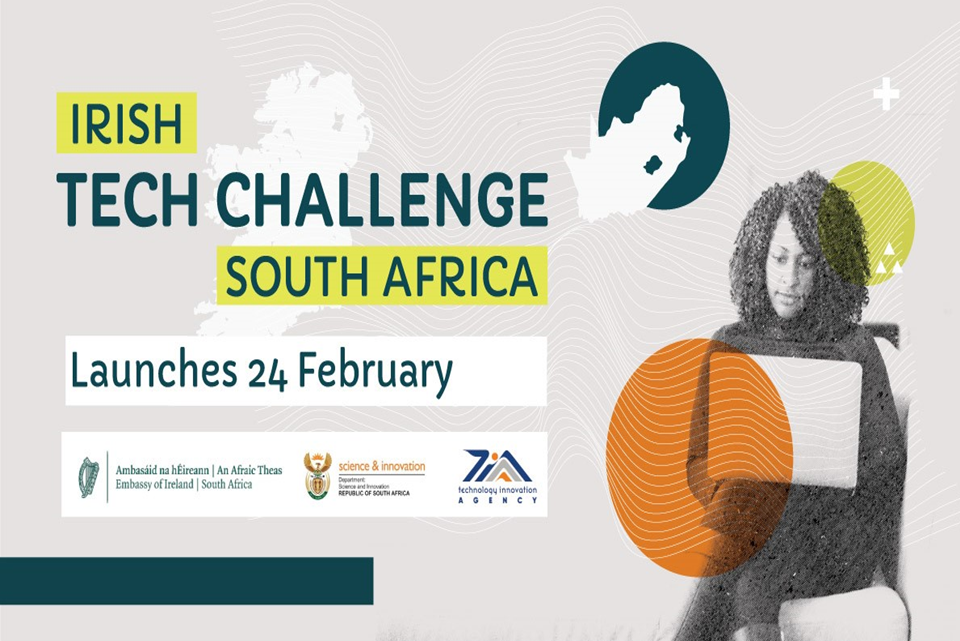New Tech Challenge Fund to Drive South African-Irish Innovation Partnership
Press release
21 February 2022
The Irish Tech Challenge South Africa
The Irish Tech Challenge South Africa seeks to drive tech innovation alongside international cooperation to support South Africa’s economic recovery.
Johannesburg, 16 February 2022 - Ireland, regarded globally as a thriving technology hub, is partnering with South Africa to support its economic recovery and competitiveness into a digital future, with the establishment of the Irish Tech Challenge South Africa. Ireland is the second-largest exporter of computer and IT services in the world and is home to nine of the top 10 US tech companies, and the top five global software companies.
The Irish Tech Challenge South Africa will be launched on February, 24 (Join the launch event virtually) and aims to build networks between South African and Irish tech ecosystems. It will offer exciting South African tech businesses the chance to travel to Ireland to meet and network with Irish tech companies and to reach potential partners and customers.
Established by the Embassy of Ireland in South Africa in partnership with the Department of Science and Innovation (DSI), and the Technology Innovation Agency (TIA), the Irish Tech Challenge South Africa aims to incentivise the birth of mutually beneficial partnerships between leading Irish technology ecosystem operators and South African entrepreneurs and their businesses. In doing so, the challenge will support innovation, technology development, and technology deployment and commercialisation in South Africa.
The Irish Tech Challenge South Africa will target five majority-owned South African tech businesses that address the United Nations’ Sustainable Development Goals (‘SDGs’), for example, through climate or med-tech solutions, with a particular focus on women and young entrepreneurs from historically disadvantaged communities.
H.E. Fionnuala Gilsenan, the Ambassador of Ireland to South Africa, adds, “High-growth impact-focused tech ventures have the potential to drive meaningful innovation, economic growth, job creation and poverty alleviation in South Africa, as well as across the African continent. Through the Tech Challenge, we are seeking to leverage Ireland’s significant-tech expertise and position as a global tech hub, to help South African impact-focused tech ventures scale globally and support inclusive economic growth in South Africa.”
Patrick Krappie, TIA’s Acting CEO concludes, “The primary obstacle for high growth potential South African entrepreneurs is that even when their products and services are ready to scale globally, they still face significant barriers such as limited resources, access to the appropriate global networks and infrastructure, alongside the rising costs of technology and talent. The Irish Tech Challenge South Africa, as an intra-government platform, therefore, seeks to remove some of those barriers.”
Interested entrepreneurs are welcome to join Thursday’s launch event virtually. Click here to register.
The virtual launch will be complemented by a live event hosted in Sandton, Johannesburg. Calls for Applications open on 24 February and will remain open until 5 April 2022.
If you are interested in being added to the database when the call launches, please email programs@impactamplifier.co.za. In the first year of the programme, The Irish Tech Challenge South Africa will provide the chosen entrepreneurs with:
- Access to €10,000 in funding, as well as the opportunity to leverage the best of Ireland’s tech expertise and business acceleration.
- A 10-day curated trip to Ireland later in the year, aimed at accessing global customers and partners.
- An increase in profile leveraged by both the Irish and South African governments.
The Irish Tech Challenge South Africa intends to leverage a suite of exciting benefits, such as partnering with relevant Irish ecosystem players - given Ireland’s growing reputation as a global technological hub - by offering access to European and international markets.
ENDS
The media are invited as follows:
Date: 24 February 2022
Time: 14h30 -18h00
Venue: Future Space, 61 Katherine Street, Sandton
For media enquiries please contact Sandra at programs@impactamplifier.co.za.
CLICK HERE TO JOIN THE LAUNCH EVENT VIRTUALLY
Website launching soon.
Twitter: @Irish_TC_SA | Facebook | LinkedIn | Instagram: @irishtechchallengesa
About Ireland Embassy South Africa
Since 1994, the Embassy of Ireland in South Africa has represented Ireland's interests in South Africa.
The Embassy works to pursue opportunities to strengthen trade and economic relations and institutional partnerships between Ireland and South Africa for inclusive economic growth. The Embassy works also to enhance links with the Irish diaspora and promote Ireland as a premier destination for education, tourism and investment.
About TIA
The Technology Innovation Agency (TIA) is a public entity in South Africa that serves as the key institutional intervention to bridge the innovation chasm (gap) between research and development from higher education institutions, science councils, public entities, and private sector companies, and commercialisation (beneficiation). TIA was established in 2010 and has a national reach with offices in KwaZulu Natal, Western Cape and Gauteng. The main thrust of the mandate of TIA is funding and supporting innovative technologies that show potential to be commercialised. The organisation also has programmes that provide non-financial support to innovators and SMMEs. Lastly, TIA is a catalyst and enabler of innovation through various partnership initiatives locally, in the African continent and globally.


